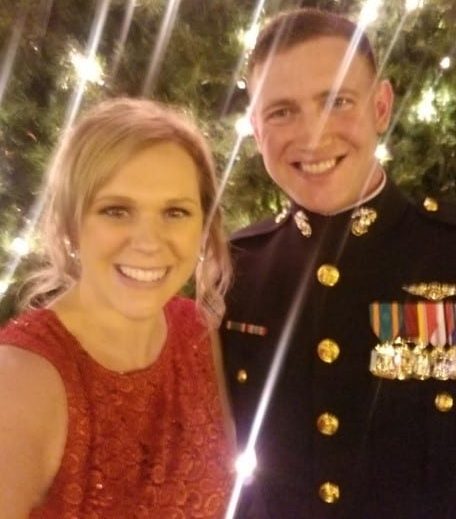by Jennifer Rea, PhD.
The military life is crazy and beautiful. It may also be a life that some “didn’t sign up for”. However, I’m a firm believer that no matter how difficult the life situation might be, there is always a silver lining.
I’ve been a military spouse for almost seven years now, with two additional years as a significant other. My spouse and I have gone through two deployments, both of which were at least seven months long. We’ve moved to four different states, missed several family events, and have survived the long-distance relationship. Through all the transitions and challenges, we have experienced unique opportunities that most may never witness in their lifetime.
The places we have lived have been so beautiful and are locations that without the military life, we probably would have never visited. We have also met the most genuine people who have become lifelong friends and we are comforted in knowing we have a friend in almost every state throughout the U.S.!
Unicorns and Rainbows
While I do believe that there are many positives to living the military life and being a military spouse, I also believe that not every day is filled with unicorns and rainbows. There are days that are tough, and some things cannot prepare us for how difficult they will be.
Findings from the 2017 Defense Department Surveys of Active Duty (AD) and Reserve Component (RC) Spouses highlight some of those challenges. The survey results were drawn from 9,813 AD spouses and roughly 9,000 RC spouses, including the National Guard. While most (60%) military spouses expressed satisfaction with military life, one of the biggest concerns for AD spouses was stress. In fact, more than half (60%) said they experienced more stress than usual and reported feeling nervous, anxious or on edge in the past two weeks. More than a third (39%) also expressed feelings of sadness, depression or hopelessness, and almost half (47%) of E1-E4 spouses expressed loneliness during deployment.
Similar to the spouses who completed these surveys, I, too, have felt (and continue to face) all these mental health and wellbeing challenges (e.g., loneliness, depression, anxiety). One of the most significant hurdles I have recently overcome is understanding who I am as a person and what I want to do professionally.
Education and Career Setbacks
It can be difficult for military spouses to find education or work in a career that is rewarding and fulfills their personal and professional goals. Research has consistently found that military spouses (93% of whom are women) experience a substantial and pervasive workforce disadvantage due to being married to someone in the military (Keeling et al., 2019).

Used with permission by MySECO.mil.
Today, the unemployment rate for AD spouses is 24% and 8% for RC spouses as compared to the national level; for women it’s 2.4% and for men, it’s 2.1% (Ott, Morgan, & Akroyd, 2018). Although the majority of the spouses are pursuing degrees at the master’s or doctoral level (58.9%), roughly 7% of spouses do not complete their education (Ott et al., 2018).
Some barriers to employment attainment and education completion for military spouses include:
- Frequent relocations (Permanent Change of duty Station (PCS) moves) hindering job experience and human capital
- Limited labor markets in which many military installations are located
- Possible employer discrimination or misperceptions in hiring military spouses
- Needing licenses or credentials in a new state and;
- Child care
As a result of spouses experiencing unemployment and underemployment, some may reduce or abandon their career aspirations or even opt out of the labor force altogether (Keeling et al., 2019). Advanced degrees may also be placed on hold due to concerns of being “overqualified” or lack of transferability in credentials. It may be that due to the challenges of not fulfilling personal, professional, and educational goals that military spouses feel increased stress and experience sadness, depression or hopelessness.
The Silver Lining

Used with permission by HiringOurHeros.org
However, despite the challenges military spouse face, they can achieve their education and career goals. It may mean military spouses need to address additional sacrifices or hurdles, especially as it pertains to planning around their family’s schedule, but it does not mean that it is impossible! In many cases, military spouses may even have a “one-up”, as they are versatile, ambitious, hardworking, and tend to reflect key marketing skills.
Supporting Military Spouses as they Pursue Education and Career Goals
What does this mean for professionals who work with military spouses?
- One of the most important things I think you can do as a professional working with a military spouse in helping them to reach their career and educational goals is to listen. It’s essential to first build trust with the spouse by listening to their desires and aspirations as well as things they struggle with the most.
- The second piece is to help spouses address scheduling concerns and identify ways to navigate through or around them. For example, a spouse may want to pursue higher education, but has three children at home. You may help them to identify online education programs or provide child care options.
- Third, it would be helpful to have a current repertoire of resources that you can share with spouses – ones that they can easily navigate.
- And a fourth tip is to share with spouses that it is OK to ask for help!
There are a number of resources that will help spouses achieve education and career goals, whether it be finishing an undergraduate degree, pursuing a training certificate or landing a new job. Here are a few:
1. Military OneSource provides a slew of resources and tools for comprehensive education and career guidance, support and resources to spouses pursuing employment or an advanced degree. These are the two resources they recommend:
a. The Department of Defense Spouse Education and Career Opportunities program, or SECO , was created specifically for military spouses—to connect them with tools and resources, including education and training help, career coaching and exploration, and career connections.
*On the MySECO website, spouses will be able to find resources and tools, including building an individual career plan , exploring the labor market, , or creating a new resume using the resume builder , as a few examples.
*Spouses also have access to career coaches through the Military OneSource website from 7 a.m. to 10 p.m. EDT Monday through Friday, and from 10 a.m. until 5 p.m. on Saturdays.
b. As part of the SECO program, the Military Spouse Employment Partnership, or MSEP connects employers with educated, trained and qualified military spouses.
2. Military spouses can upgrade to LinkedIn Premium at no cost during a PCS or separation from the military. This tool may help spouses network for employment opportunities.
3. The U.S. Department of Education College Scorecard can help spouses find out about colleges, including programs, costs, admissions, and more.
4. The Department of Defense’s Defense-State Liaison Office and SECO worked to streamline state licensing procedures to make it easier for spouses to find a job.
5. The U.S. Department of Labor developed a new webpage that also brings together occupational license portability resources and highlights states with licensing rights for spouses.
6. Veterans’ Employment and Training Services in the Labor Department has a great program to help military spouses make the move from one state to another and keep their employability through the transfer of credentials.
7. The 2018 National Defense Authorization Act allows each service branch to reimburse spouses up to $1,000 for re-licensure and certification costs resulting from relocations or PCS moves that cross U.S. state lines.
Military OneSource also provides the MyCAA Scholarship , a $4,000, noncompetitive scholarship for spouses that can used for associate degrees, licenses and certifications.
8. Spouses are eligible for benefits that offer aid in pursuing a postsecondary degree and advancing career goals. Here is a comprehensive list of spouse education benefits from Military OneSource.
9. The Great Plains Interactive Distance Education Alliance (Great Plains IDEA) is a consortium of reputable universities who offer online, flexible and affordable programs. *There is no degree completion timeline requirement.
10. MySECO and Military OneSource have developed the Military Spouse Transition Program (MySTeP), created specifically for military spouses to support and encourage them throughout their time in the military. MySTeP also provides a list of education- and career-related resources.
To find more resources for helping service members and their families build the skills to be resilient and overcome other transition-related challenges visit our Family Transitions page.
This article was written by Jennifer Rea, PhD and military spouse to an Active Duty Marine. Jenny consults with the OneOp Family Transitions team to support professional development for military family service providers. You may find more blogs, podcasts and webinars from Family Transitions. We invite you to engage with Family Transitions on Twitter @MFLNFT and with OneOp on Facebook @MilitaryFamilies.
References
1. Keeling, M., Borah, E. V., Kintzle, S., Kleykamp, M., & Robertson, H. C. (2019). Military spouses transition too! A call to action to address spouses’ military to civilian transition. Journal of Family Social Work, Online First. doi: 10.1080/10522158.2019.1652219
2. Ott, L. E., Morgan, J. K., & Akroyd, H. D. (2018). Impact of military lifestyle on military spouses’ educational and career goals. Journal of Research in Education, 28(1), 30-61.















